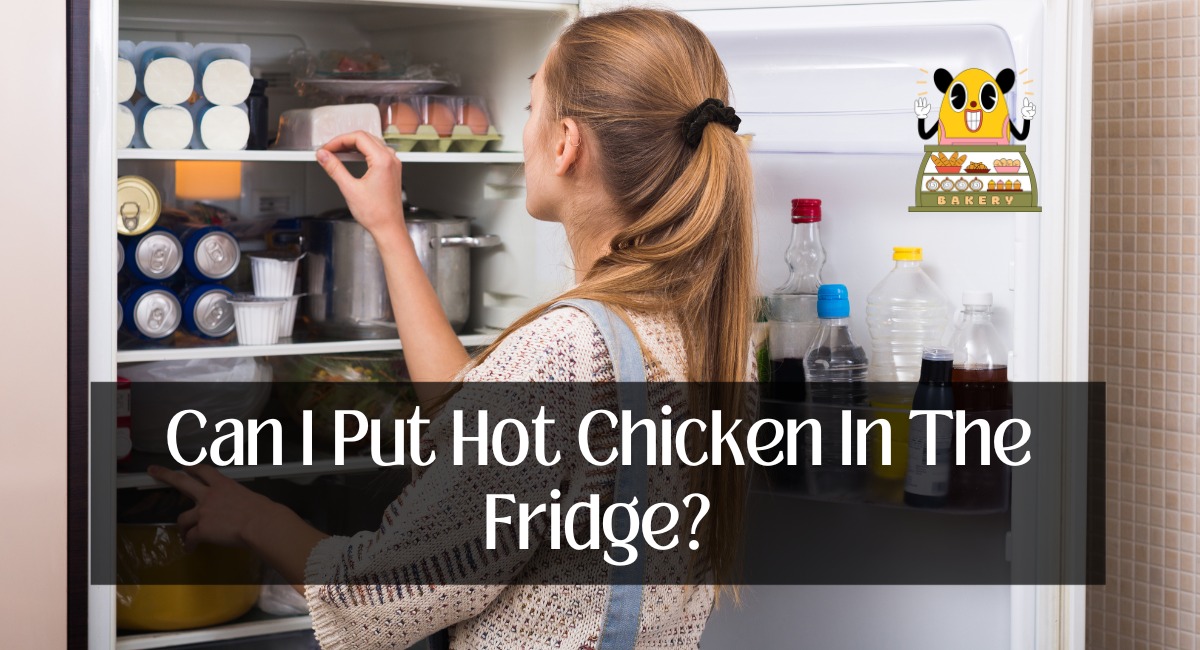Putting hot chicken in the fridge is a common culinary question, whether it’s leftover from a delicious homemade meal or a takeout treat.
The sizzling smell of freshly cooked chicken tempts us to save its flavor and texture for later. However, this relatively simple task requires knowledge to ensure food safety and chicken flavor. T
he perfect time and packing might affect taste and health in this crucial step. This tutorial explains the physics of refrigerating hot chicken to help you balance flavor and food safety.
Continue reading to find out how to securely store hot poultry in the fridge.
Can I Put Hot Chicken In The Fridge?
Yes, hot chicken can go in the fridge. Before putting the chicken in the fridge, it needs to cool down a bit so that the temperature inside the fridge doesn’t rise quickly. To stop germs from growing, you should try to put the hot chicken in the fridge within two hours of cooking it.
Let the hot chicken sit out at room temperature for about 20 to 30 minutes to cool it down before putting it in the fridge. After that, you can put it in a container that won’t let air in or tightly wrap it in plastic wrap or aluminum foil. This helps stop the loss of wetness and the spread of germs.
Once the hot chicken is in the right containers, put it in the fridge. Make sure the temperature in the fridge is set to 40°F (4°C) or lower to keep the chicken safe to eat. Eating the hot chicken that has been chilled within 3–4 days is also a good idea to ensure it stays fresh and safe.
If you need to store a lot of hot chicken, you can split it into smaller pieces before putting it in the fridge. This makes the chicken cool down faster and more evenly.
Don’t put very hot food straight into the fridge because it could raise the temperature inside and affect other things in the fridge.
How Long Can You Keep Chicken In The Fridge?
Cooked chicken is usually best eaten within 3–4 days of refrigeration. This time limit ensures chicken safety and quality. But there are some things to consider when keeping chicken fresh and safe.
First, store things properly. Let boiled chicken cool to room temperature before refrigerating. Hot or warm chicken can warm the fridge, making other fresh foods unsafe.
Store chicken in an airtight container or tightly wrapped in plastic or aluminum foil. This keeps air and moisture out of the chicken, preserving its flavor and freshness. Before storing, chop the chicken into smaller pieces. It may cool faster and more evenly.
Chicken should be placed on a shelf or in a separate refrigerator section to avoid cross-contamination. This keeps chicken fluids off other things and bacteria away.
If you won’t eat the chicken within 3–4 days, freeze it. Cool the chicken before freezing. It should be in a freezer-safe jar or tightly wrapped in plastic. Proper packaging prevents freezer burn and preserves chicken quality.
Write the chicken’s freeze date on the container to track its time in the freezer. Cooked chicken can be frozen for two to six months, depending on the freezer and packing.
These principles offer you a basic concept of when food is safe to eat but use your best judgment. Better safe than sorry, discard chicken with a foul smell, texture, or color.
How To Properly Store Cooked Chicken?
Cool Down Before Storing: Allow the cooked chicken to cool down to room temperature before storing it in the refrigerator. Hot food can cause the inside temperature of the refrigerator to rise, affecting other perishables.
Use Airtight Containers: To keep air and moisture out of the chicken, store it in airtight containers. This helps to preserve the flavor and keeps it from drying out.
Wrap With Plastic Wrap: If you don’t have any airtight containers, securely wrap the chicken in plastic wrap or aluminum foil. To avoid air exposure, ensure that everything is properly covered.
Divide Into Portions: Consider dividing the cooked chicken into smaller chunks before storage. When you’re ready to eat, this allows for faster cooling and easier reheating.
Separate From Other Foods: Keep cooked chicken on a shelf or in a dedicated section of the fridge away from raw meats and other foods. This eliminates the possibility of cross-contamination.
Label With Date: Label the container with the date of preparation if you’re storing the chicken for a few days. This allows you to keep track of how long it’s been in the refrigerator.
Transparent Containers: If at all possible, use transparent containers. This allows you to inspect the contents without having to open the container, decreasing your exposure to air and temperature fluctuations.
Add Moisture: To keep the chicken from drying out, place a little damp paper towel alongside it in the container. This aids in the preservation of moisture.
Freezer-Safe Bags: If freezing the chicken, use freezer-safe resealable plastic bags. To avoid freezer burn, squeeze out any excess air before sealing.
Maintain Consistent Temperature: Keep your fridge at 40°F (4.4°C) or lower to protect the chicken from bacterial growth.
Tips For Food Safety
- Always wait until hot food has cooled down before putting it in the refrigerator.
- When storing chicken, make sure you use containers that are airtight or appropriate wrapping.
- Consume any leftovers within a few days to ensure the food’s quality is not compromised.
- Bring the temperature of the chicken back up to 165 degrees Fahrenheit (74 degrees Celsius).
- Maintaining appropriate hygiene is necessary to avoid the spread of disease.
Thanks for reading. I hope you find it helpful.

